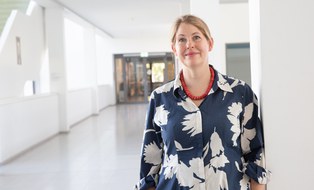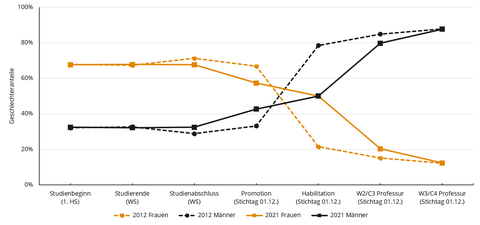Gender Equality
Surveys show that since 1998, women have continually enrolled more at university than men. The proportion of women studying Human Medicine has reached nearly 70%, and this figure is even higher in Dentistry. Women also make up about 2/3 of all PhD students – a clear majority. Yet it is still predominantly men who are hired for leadership roles and thus strategic decision-making positions. When it comes to gender equality and women’s participation at the leadership level in academia and research, it is a matter exercising a basic right. The direction that medicine will head in and its overall relevance in society will be characterized by (the lack of) diversity at the leadership levels. That is why we, the Equal Opportunities Officers, are taking stock of the current state of affairs at the Faculty and advising those in directorial positions on how to improve gender equality.
Table of contents
Current state of affairs at TU Dresden’s Faculty of Medicine
At TU Dresden’s Faculty of Medicine, women make up more than half of the academic staff. Yet the percentage of women is higher the more precarious the work is. In 2021, women made up 55.3% of employees with full-time permanent contracts. Of the employees with fixed-term contracts, they made up 56.5% working full time and 65.3% working part time – a significantly greater proportion. And of the Research Assistants, 80% are women – the vast majority. Overall, the proportion of women in precarious positions has consistently remained considerably higher than their male counterparts.
Women earn over 50% of the Doctorate degrees awarded, and this figure was also achieved in the postdoctoral domain in 2020. The significant career slump for women has therefore been shifted further back from the time between doctoral and postdoctoral studies in the direction of professorship. Although more women pursue a doctorate and we are seeing an increase in women postdocs, the proportion of women professors is very low, with women occupying only 20.3% of W2/C3 and 12.3% of W3/C4 positions (salary scales for professors in Germany). A slightly positive development can be seen solely among W2-level professorship positions, while the proportion of women in W3-level positions continues to stagnate.
We, the Equal Opportunities Officers, take part in appointment procedures, where we ensure that the Appointment Committee works without bias or prejudice to afford an equal opportunity to people of all genders. We document this in our independent statements on appointment procedures. Pursuant to TU Dresden’s Equality Concept, we must also be included in employment procedures for permanent contracts and in cases where the fixed term of a contracted position is lifted. We continually compile statistical data to accurately advise the Faculty and raise awareness of any problem areas with regard to gender equality and proportions.
Additional information
Position paper – “Standpunkte für eine geschlechtergerechte Hochschulpolitik”
Universities influence society and, as public institutions, are bound by legislation. At the same time, universities have not yet fully implemented gender equality as formalized in the Basic Law. Gender-based bias and discriminatory mechanisms are still present at universities just as they are anywhere else. As a voice for gender policy in scientific and academic discourse, the Bundeskonferenz der Frauen- und Gleichstellungsbeauftragten an Hochschulen (Federal Conference of Women’s and Equal Opportunities Officers at Universities; bukof) is calling for a cultural shift in gender and social policy: position paper (in German)
TIN*clusive University
The TU Dresden as a TIN*clusive University (TIN*: trans-, inter- and non-binary gender identity) supports all gender identities of its members and recognizes the dgti supplementary identity card. In addition, TU Dresden offers peer counselling for its queer members: contact Fay Uhlmann at .
Women in medicine – in particular in hematology and oncology
The Deutsche Gesellschaft für Hämatologie und Medizinische Onkologie (German Society for Hematology and Medical Oncology) addresses the situation of women in medicine both in general as well as in hematology and oncology in particular in Volumes 5 and 19 of its publication series on health policy: DGHO publication series (in German).
Call for more women in leadership positions in medicine
The German Medical Women’s Association (Deutscher Ärztinnenbund; DÄB) calls for gender equality to be secured also in the medical field. In the future, a balance of genders should be ensured even in leadership positions such as those of chief physician, clinic director, in committees for medical self-governance and research. Like the ProQuote Medizin initiative, the DÄB thus also calls for a binding, set gender quota in the health industry to counteract existing inequity between genders.
Contact
Please contact me with any questions you may have regarding equal opportunity and gender equality in the realm of studies or professional life, e.g. appointment and employment procedures, experienced or observed discrimination, project ideas, etc.
 © Stephan Wiegand
© Stephan Wiegand
Head of DSCS
NameKatja El-Armouche
Send encrypted email via the SecureMail portal (for TUD external users only).

